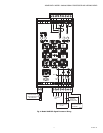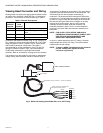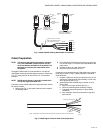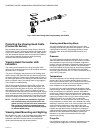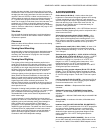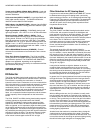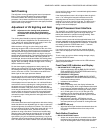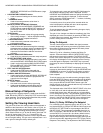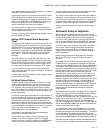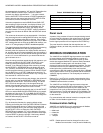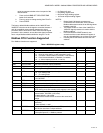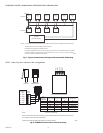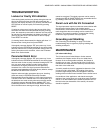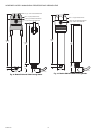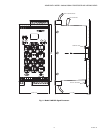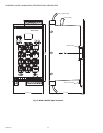HONEYWELL MODEL 700/800 SIGNAL PROCESSOR AND VIEWING HEAD
13 66-2069—02
is live. Adjustments will cause the Flame Relay to de-energize
immediately, ignoring FFRT settings.
To access this setpoint, press and hold the ACCEPT RATIO/
SET GAIN button for 2 seconds until the current value is
displayed. While the value is displayed, adjustments may be
made via the INCREASE or DECREASE arrow buttons. To
store the new setting, press the STORE button until “- -” is
shown, indicating the value has been accepted.
If no activity occurs for a period of four seconds while the
value is displayed, the RATIO display will disappear and the
old ratio setpoint will take effect.
To exit the menu at any time without saving changes, simply
press the RESET/rE button.
Setting FFRT (Flame Failure Response
Time)
To access the FFRT setpoint, press and hold the FFRT 1/2/3
SEC OPTION button for 2 seconds until the current value is
displayed. Refer to Fig. 24 for the setup flowchart. The FFRT
can be set at 1, 2 or 3 seconds. While the value is displayed,
adjustments may be made via the INCREASE or DECREASE
arrow buttons. To store the new setting, press the STORE
button until “- -” is shown, indicating the value has been
accepted.
The FFRT changes are not live; they take effect only if the
STORE button is pressed. FFRT values do not relate to the
RELAY ON SETPOINT and RATIO (%)/RELAY OFF values.
Therefore, during automatic setup, if the AUTO SET LED is
on, confirmation is not needed to change the FFRT setting.
If no activity occurs for a period of four seconds while the
value is displayed, the FFRT display will disappear and the old
setpoint will take effect.
To exit the menu at any time without saving changes, simply
press the RESET/rE button.
0/4-20mA Output Option
An analog output current is provided for operating a remote
meter or other instrumentation. The load resistance should
not exceed 360 Ohms for the Model 700 signal processors.
The resistance can be chosen to give the desired voltage
swing. For example, if 2V is desired for a 20 mA output, a 100
Ohm resistor would be used. Fig. 25 contains a flowchart for
the mA output setup.
The analog current output selections are 0 to 20 milliamps, or
from 4 to 20 milliamps. Selection of the applicable range is
made by pressing and holding the 0-20 MA/4-20 MA OPTION
button until the current value is shown. 02 denotes the 0-
20mA selection while 42 denotes the 4-20mA selection (the
default value). While the value is displayed, it may be changed
via the INCREASE or DECREASE arrow buttons. To store the
new setting, press the STORE button until “- -” is shown,
indicating the value has been accepted.
Confirmation is not requested if the 0-20/4-20 setting is
changed when AUTOSET LED is on
The 0/4-20mA output option is live; the operative range
changes as soon as the displayed selection is changed.
However, the value must still be saved via the STORE button
in order to be saved in the signal processor's EEPROM.
To exit the menu at any time without saving changes, simply
press the RESET/rE button or wait four seconds.
The analog current output is scaled according to the RELAY
ON setting. It is scaled so that, if the counts coming in are at a
count rate equal to the RELAY ON setting, the current output
is approximately 13 MA when the range selected is 0-20 MA,
and about 14.6 MA when the range selected is 4-20 MA.
Note that the actual maximum level for the current output is
19.8 MA.
Automatic Setup of Setpoints
With this feature, the Model 700 signal processors set the
RELAY ON SET POINT, the RATIO % (Relay Off), and the UV/
IR GAIN automatically. Calculations for these settings are
carried out in the signal processor as the operator takes the
system through BURNER ON and BURNER OFF sequences.
Fig. 19, 20 and 21 flowchart the automatic setup sequence.
The FFRT (flame failure response time) and the 0/4-20mA
output option must be manually setup after the automatic
setup process is complete. Refer to the Manual Setup of
Setpoints section and Fig. 24 and 25. for details on setting
these 2 parameters.
Before starting the automatic setup sequence, adjust the
RELAY ON SET POINT to get the FLAME ON relay to
energize.
Press BNR-ON SEQ START/END key for two seconds. If the
FLAME ON relay is de-energized, the display will show “bo”
(burner off); press RESET to clear this. If the FLAME ON relay
is energized, the ON SEQ LED will start flashing slowly and
the numeric display will start counting down from 59 while the
processor takes data at one reading per second. The FLAME
ON relay will remain energized if the flame is present,
according to the current settings, until valid new values are
obtained. To end the data sampling, press the same button,
BNR-ON SEQ START/END, again, but ensure that an
adequate number of data samples has been taken. At least 30
seconds of BNR-ON data sampling is recommended; ten
seconds is a minimum. The software will not respond to a
second press of the button for 10 seconds. RESET may also
be pressed while the data sampling is occurring; the data
sampling process will be aborted and the old values will
remain in effect.
After BNR-ON data sampling is complete, the OFF SEQ LED
flashes. Turn off the burner and immediately press the BNR-
OFF SEQ START/END key (a two-second press is not
required). The displayed timer then counts down from 29. This
process may be interrupted, but at least 15 seconds of BNR-
OFF data sampling is recommended. The data sampling
process can be aborted by pressing RESET, in which case the
data for both BNR-ON and BNR-OFF will be discarded and the
previous values will remain in effect.
If the data is good, that is, the computed ratio is 71% or less
when BNR-OFF data sampling is complete, the display shows
the ratio in percentage for one second, followed by “- -” to indicate
a successful setup. The signal processor then turns on the
AUTO SET LED to verify that the values stored internally were
derived from the BNR-ON/BNR- OFF data sampling sequence.
If the data received is marginal, with the computed ratio ranging
from 72% to 80%, the display alternates be- tween “AC” and



